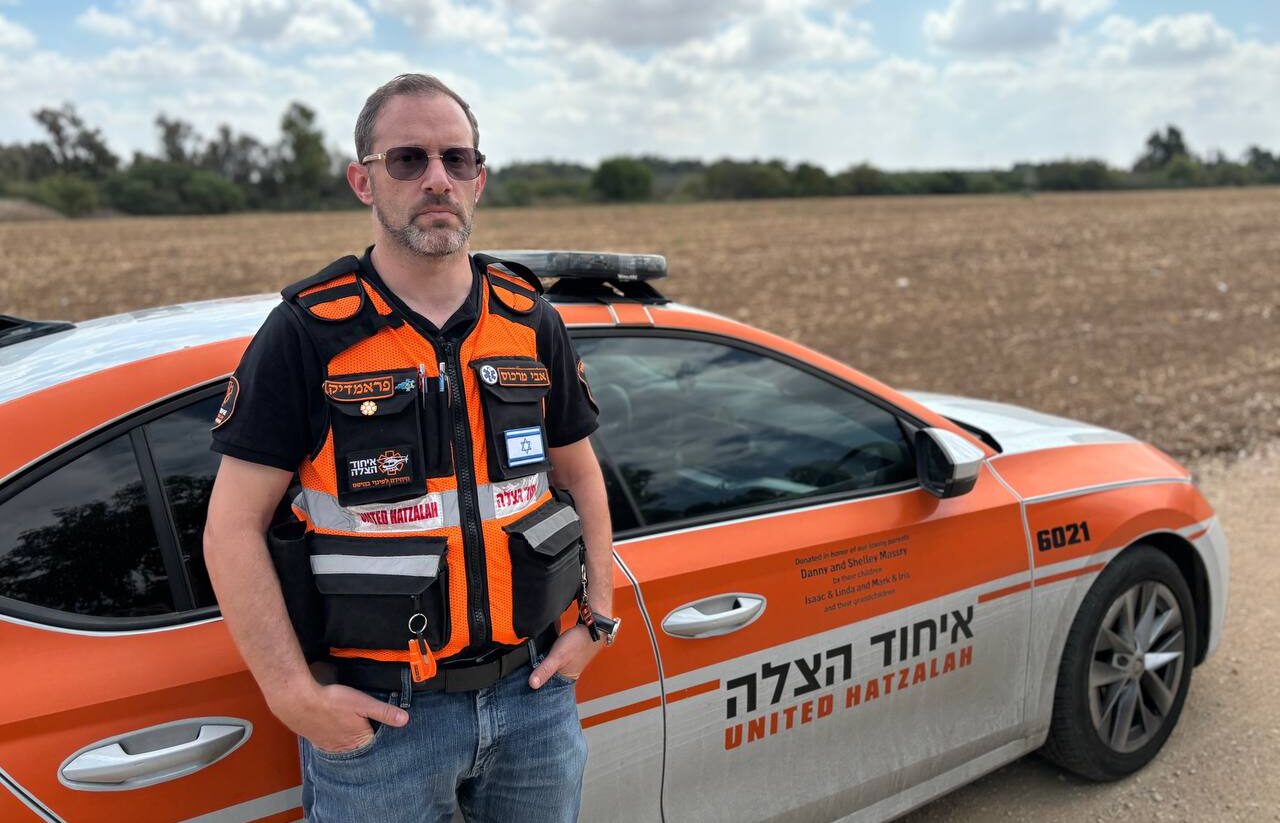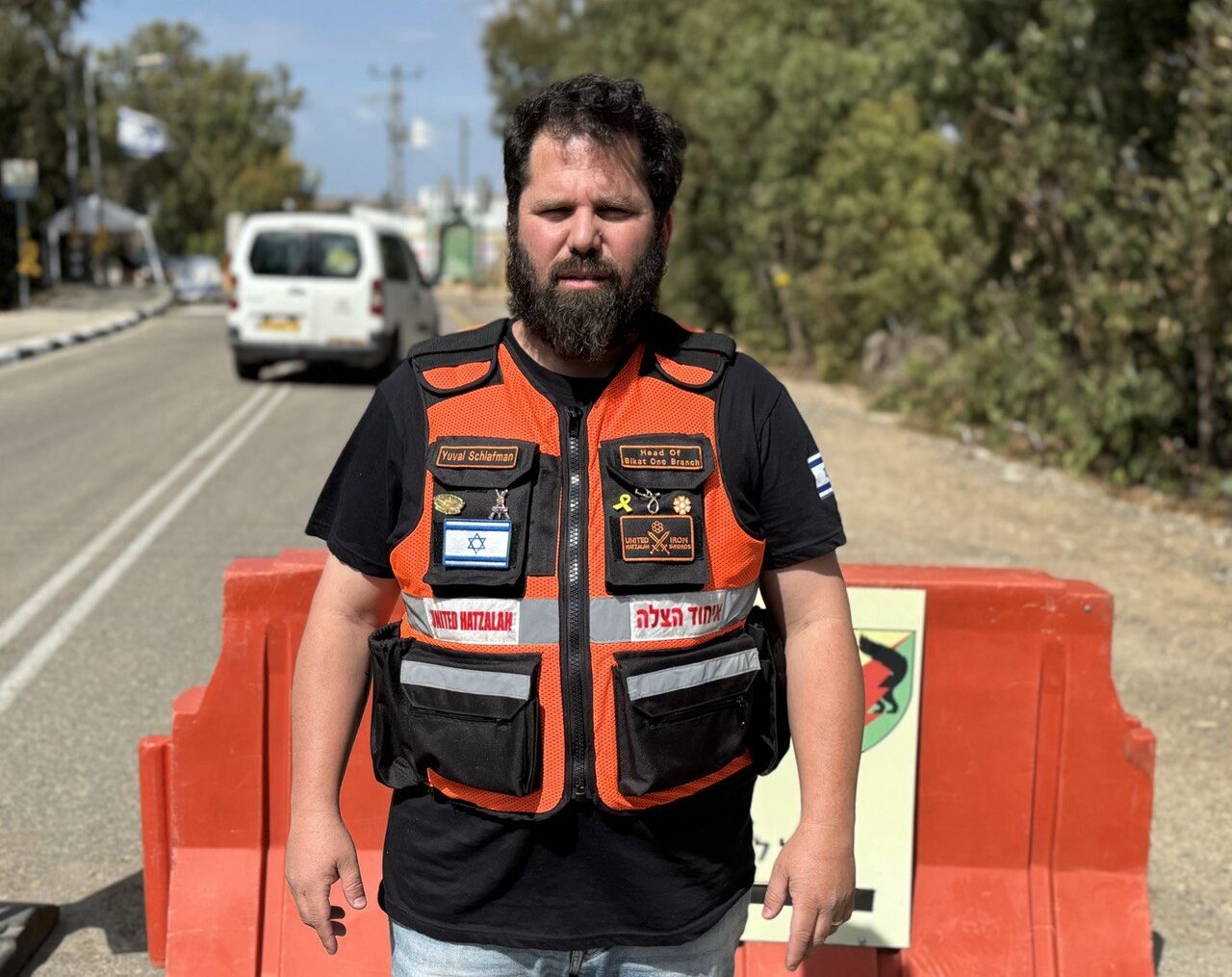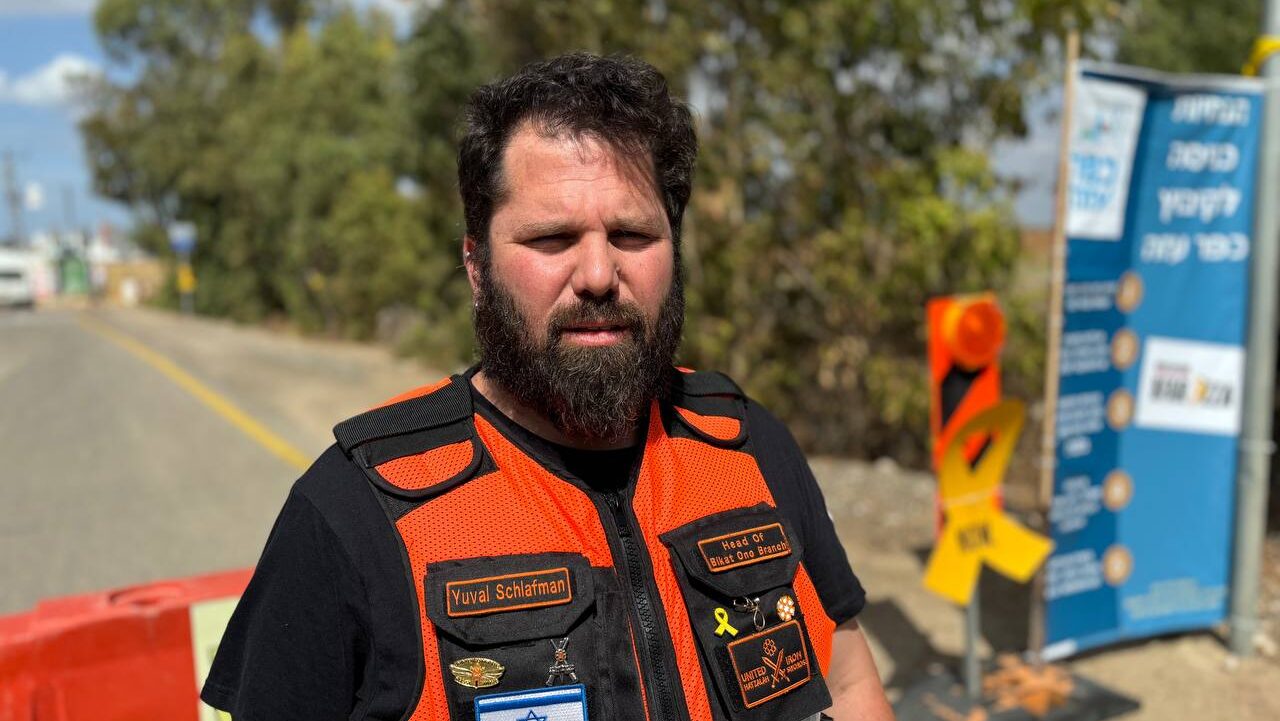‘We Have To Keep Him Alive’: United Hatzalah Heroes Recall Harrowing Helicopter Rescues During Hamas Attack
Despite life-threatening attack, volunteers like Avi Marcus and Yuval Schlafman risked everything to rescue the wounded. Today, the emotional toll of that day still remains heavy.
On October 7, 2023, as Hamas launched a devastating attack on Israel, resulting in over 1,200 deaths and the abduction of 251 people, United Hatzalah volunteers, including paramedics, doctors, and medics, rushed to the south to save lives. These volunteers, among them Avi Marcus and Yuval Schlafman, risked their lives amid bombs and gunfire.
Marcus, a flight paramedic with United Hatzalah, vividly remembers how the day began:
“I woke up at 6:30 a.m. at home with my family. By 12:30 p.m., I was already at Heletz Junction near Sderot, treating wounded soldiers and civilians. Some of the wounded were taken to hospitals; others went back to fight after we treated them,” he told The Media Line.

Avi Marcus, a flight paramedic with United Hatzalah. (Courtesy United Hatzalah)
United Hatzalah helicopters arrived early that afternoon, around 3:45 p.m.
“Two helicopters landed, and we immediately had two severely injured soldiers ready to go,” Marcus recalled. “One had been shot in the stomach. We saved his life. Another had been shot in the shoulder and thigh. Within two minutes, they were in the air, headed for the hospital.”
For Marcus, this was one of the day’s most intense moments. “We ended up transporting nine severely wounded people to hospitals that day, and I’m certain we saved their lives,” he said.
Marcus played a critical role in coordinating helicopter landings on October 7, needing to find suitable fields for them to land and ensuring no debris would interfere with the aircraft.
“It’s a lot harder than it seems. A helicopter needs a large, clear space, and with bombs falling nearby, it wasn’t easy.”
“This place wasn’t secure at all—bombs and gunfire were close, so the helicopters had to land and take off quickly. Within two minutes, we had two severely injured soldiers in the air,” he added.
Landing a helicopter in a war zone is incredibly dangerous. But we knew that saving lives was the priority.
“Landing a helicopter in a war zone is incredibly dangerous,” Marcus emphasized. “But we knew that saving lives was the priority. Later that day, even the 669 unit of the Israeli army landed helicopters here. This spot became a central point for all the wounded to come for treatment before being taken to hospitals around Israel.”
This holiday season, give to:
Truth and understanding
The Media Line's intrepid correspondents are in Israel, Gaza, Lebanon, Syria and Pakistan providing first-person reporting.
They all said they cover it.
We see it.
We report with just one agenda: the truth.


Treating patients inside the helicopters presented its own set of challenges.
“There’s barely enough space to treat patients inside. And the engine noise makes verbal communication impossible, so we rely on hand signals,” Marcus explained.
Despite saving lives, the trauma from that day lingers.
I have flashbacks. I don’t sleep well at night. I think about the people who were killed, the ones who were kidnapped, and the medics who were there with me.
“I have flashbacks,” Marcus admitted. “I don’t sleep well at night. I think about the people who were killed, the ones who were kidnapped, and the medics who were there with me. A lot of them are still dealing with flashbacks and other memories from the 7th.”
Schlafman, a long-time United Hatzalah volunteer, also recalls the intensity of October 7.

Long-time United Hatzalah volunteer EMT Yuval Schlafman. (Courtesy United Hatzalah)
“In the morning, I woke up to the sound of sirens, but I quickly realized this was different,” Schlafman told The Media Line. “I rushed to Kfar Aza, where we began treating and evacuating hundreds of wounded soldiers and civilians.”
His day included harrowing moments, such as evacuating a severely injured high-ranking officer.
“We didn’t have any ambulances left, so we grabbed a white pickup truck, stabilized him as best we could, and drove to Heletz Junction. I kept hearing this empty noise in my head—like everything was fading—and all I could think was, we have to keep him alive.”
Schlafman and his team managed to transfer the officer to a helicopter, and after a few hours, they confirmed that his life had been saved. “We hugged each other and cried,” he shared.
Later that evening, Schlafman helped evacuate a mother and her four children, who had been trapped in a shelter since early morning.
“They were wearing only pajama pants—exhausted, cold, and terrified,” he recalled. As they covered the family with rescue blankets, artillery sirens sounded again.
“We lay on top of them to protect them with our vests,” Schlafman explained. To ease the children’s fear, he asked one of them what music or TV show they liked and played it on his phone. “We all started singing together—me, the soldiers, the kids,” he said.
I know my father was killed, but you saved the rest of my family. Thank you.
After the sirens stopped, one of the children hugged Schlafman and said, “I know my father was killed, but you saved the rest of my family. Thank you.”
“We cried together,” Schlafman shared.
Returning to these areas remains difficult for the volunteers.
“It’s the first time I’m here since October 7, and it’s very emotional,” Schlafman said.
“I have hundreds of images in my mind—wounded soldiers, dead civilians. These memories will stay with me forever,” he admitted.
Despite the emotional toll, both Marcus and Schlafman continue their work with United Hatzalah.

